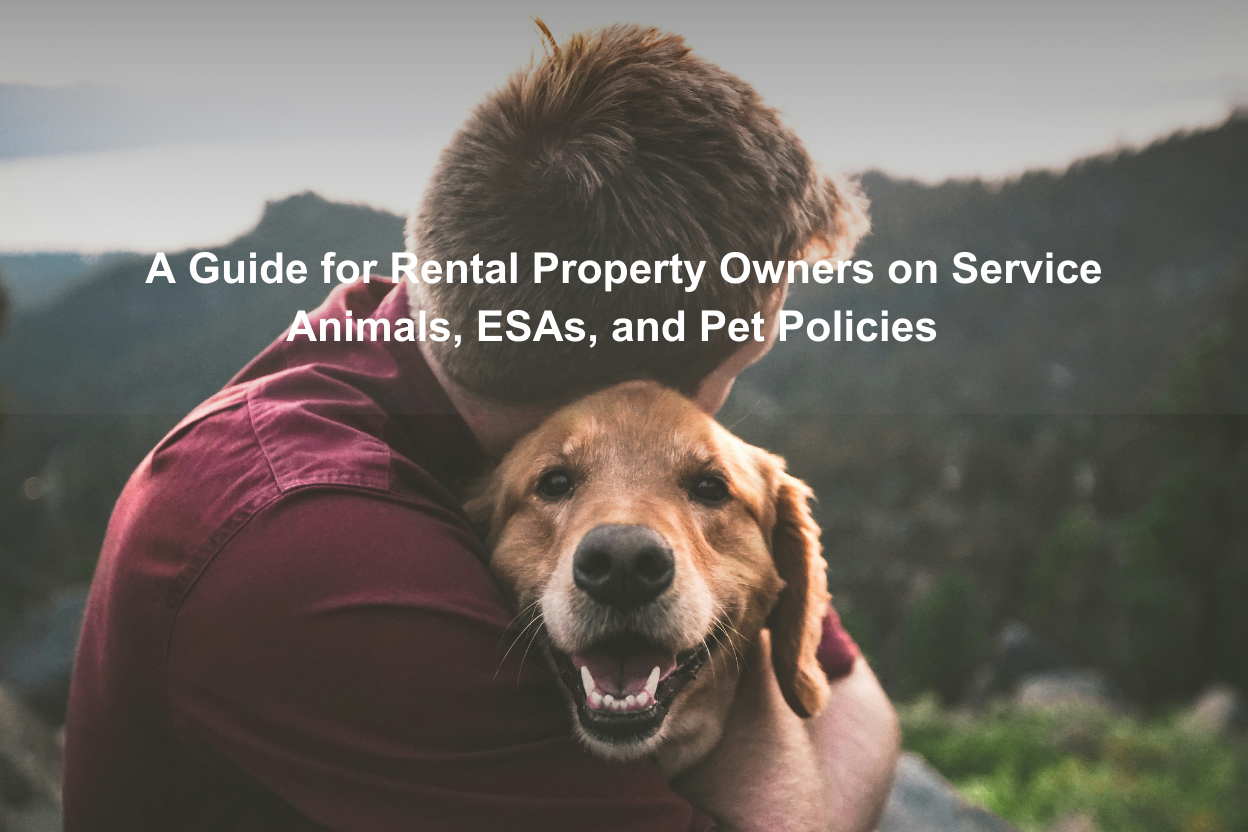If you own a rental property in Raleigh—or anywhere in the Triangle—chances are you've considered whether or not to allow pets. Maybe you’ve decided to stick with a “no pets” policy to avoid damage or risk.
But here’s where things can get legally tricky: Not every animal is considered a pet under the law.
When is an animal not a pet?
Under federal housing regulations, service animals and emotional support animals (ESAs) are considered reasonable accommodations for individuals with disabilities—not pets. That means if a qualified applicant applies with one of these animals, your pet policy no longer applies. And denying them could land you in hot water—fast.
Here’s what you need to know to protect your investment, stay fully compliant, and make smart, informed decisions as a landlord or investor in North Carolina.

The Legal Basics: Service Animals, ESAs, and Your Obligations
Two federal laws set the framework for how landlords must handle assistance animals:
- The Fair Housing Act (FHA)
- The Americans with Disabilities Act (ADA) (mostly applies to public spaces like leasing offices)
Under the FHA, landlords must provide reasonable accommodations for tenants with disabilities. That includes allowing a service animal or emotional support animal even if your lease says “no pets allowed.”
Here’s the difference:
| Type of Animal | Legally a Pet? | What It Does | Covered by FHA? | Fees Allowed? |
|---|---|---|---|---|
| Service Animal | ❌ No | Trained to perform specific tasks for a disability (e.g., guide dog for the blind) | ✅ Yes | ❌ No |
| Emotional Support Animal (ESA) | ❌ No | Provides comfort or therapeutic support for a diagnosed emotional/mental condition | ✅ Yes | ❌ No |
| Pet | ✅ Yes | Companion animal with no legal accommodation status | ❌ No | ✅ Yes (pet rent, deposit, fees allowed) |
Additional Resources for NC Landlords
For a local, landlord-friendly guide to assistance animal policies and fair housing compliance in North Carolina, check out the Fair Housing Project’s page:
Assistance Animals Under the Fair Housing Act — Legal Aid of North Carolina’s Fair Housing Project
This resource breaks down:
- When and how to grant reasonable accommodations under “no‑pets” rules
- What documentation is acceptable and lawful
- How to protect your property while remaining compliant
What You Can and Can’t Ask As a Landlord
When a prospective tenant discloses a service animal or ESA, many landlords feel uncertain about what questions are appropriate. Here's a breakdown:
✅ You Can Ask:
- If the animal is required due to a disability
- For documentation if the disability isn’t obvious (especially for ESAs)
🚫 You Can’t Ask:
- What the tenant’s diagnosis or disability is
- For training certificates, registration numbers, or proof of service animal certification (none is required by law)
- For pet rent, deposits, or pet fees—assistance animals are not subject to these charges
Important: These rules apply whether you’re renting out a condo in Morrisville, a townhome in Apex, or a single-family property in Holly Springs. Don’t assume Fair Housing laws only apply to large apartment buildings—they don’t.
Can You Still Set Expectations for Animal Behavior?
Yes, and you should.
Whether it’s a pet or an assistance animal, tenants are responsible for:
- Cleaning up after the animal
- Preventing damage to the property
- Ensuring the animal doesn’t pose a threat or nuisance
You’re not required to accept animals that are aggressive or destructive. But be cautious—denials must be based on direct evidence (not assumptions or breed biases). If you’re unsure, talk to a qualified attorney or your property manager before denying an applicant based on their animal.
Why Allowing Pets Can Actually Help Your Investment
Even beyond service animals and ESAs, allowing pets in general can be a smart move. We know it sounds risky—but here’s what the data shows:
Benefits of a Pet-Friendly Policy:
- Faster leasing: Pet-friendly listings rent quicker than pet-restricted ones
- Higher rent potential: Owners can charge pet rent or pet fees (for standard pets only—not assistance animals)
- Longer tenancies: Pet owners often stay longer, reducing turnover and vacancy costs
- Larger applicant pool: More than 70% of U.S. renters own pets—why limit your market?
Of course, we always recommend a strong pet policy with clear rules, approval requirements, and damage accountability. That’s something we implement for our owners to reduce risk and increase peace of mind.
At MasterKey, we help you strike the right balance: protecting your property while appealing to a broader range of quality renters.

Quick Misconceptions—Cleared Up for Owners
| ❌ Myth | ✅ Reality |
|---|---|
| “If I say no pets, I don’t have to deal with animals.” | Not true if it’s a service animal or ESA—they’re protected by law. |
| “I can charge pet fees for ESAs.” | You can’t. That’s a Fair Housing violation. |
| “I need a certificate for their service dog.” | There’s no such requirement. |
| “I don’t allow big dogs, so I can say no.” | Size and breed restrictions cannot apply to assistance animals. |
Why It Matters for Owners and Investors
Whether you're a first-time landlord or managing a growing portfolio, navigating service animals and pet policies requires clarity, consistency, and compliance. Mistakes can lead to:
- Formal Fair Housing complaints
- Legal disputes or fines
- Reputational harm—especially in today’s online review climate
The good news? You don’t have to navigate this alone.
How MasterKey Keeps You Compliant—and Competitive
At MasterKey Property Management, we work with owners across Raleigh, Raleigh, and the Triangle to ensure that:
- Assistance animal requests are handled lawfully and respectfully
- Pet policies are written clearly, enforced consistently, and protect your property
- You avoid costly Fair Housing mistakes
- Your rentals appeal to the right tenants—without unnecessary risk
We combine deep legal understanding with local expertise, offering peace of mind in an area where one misstep could cost thousands.
The Bottom Line
Assistance animals are not pets—and treating them as such can land owners in legal trouble. But beyond legal obligations, it may be time to rethink your stance on pets altogether. Allowing them—when done right—can reduce vacancy, boost ROI, and attract longer-term tenants.
Whether you’re evaluating your current pet policy or need help processing an ESA request, MasterKey is here to protect your investment—and simplify the process.
Want a property manager who knows how to protect your investment and boost your ROI?
Let’s talk about how MasterKey’s proven expertise can help you
manage smarter and earn more—without the stress.
📞 919.655.3950



.JPG)